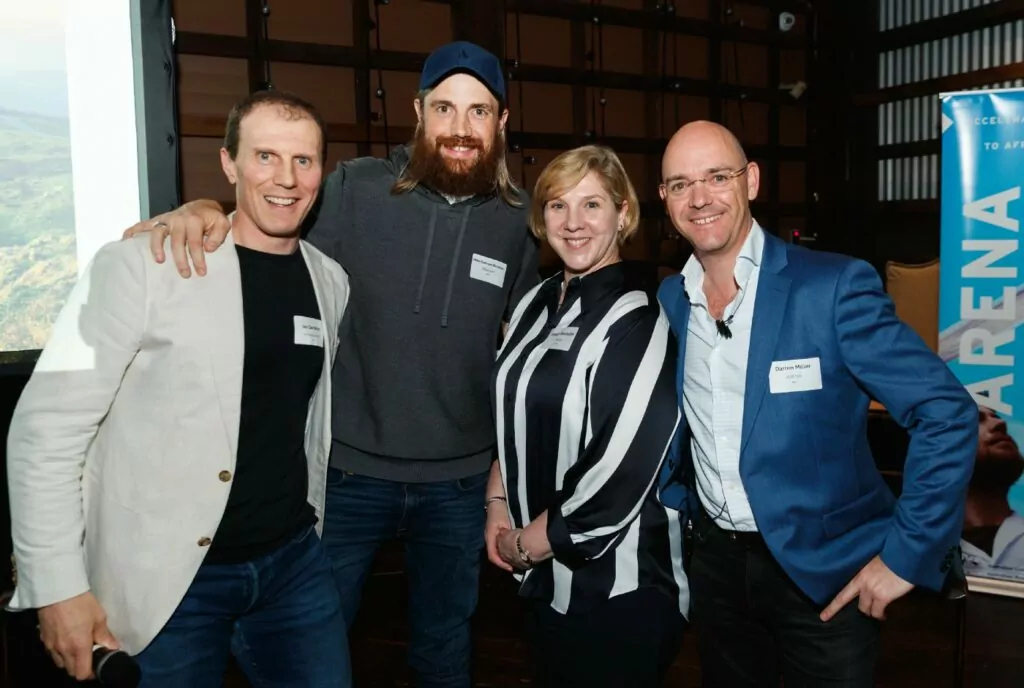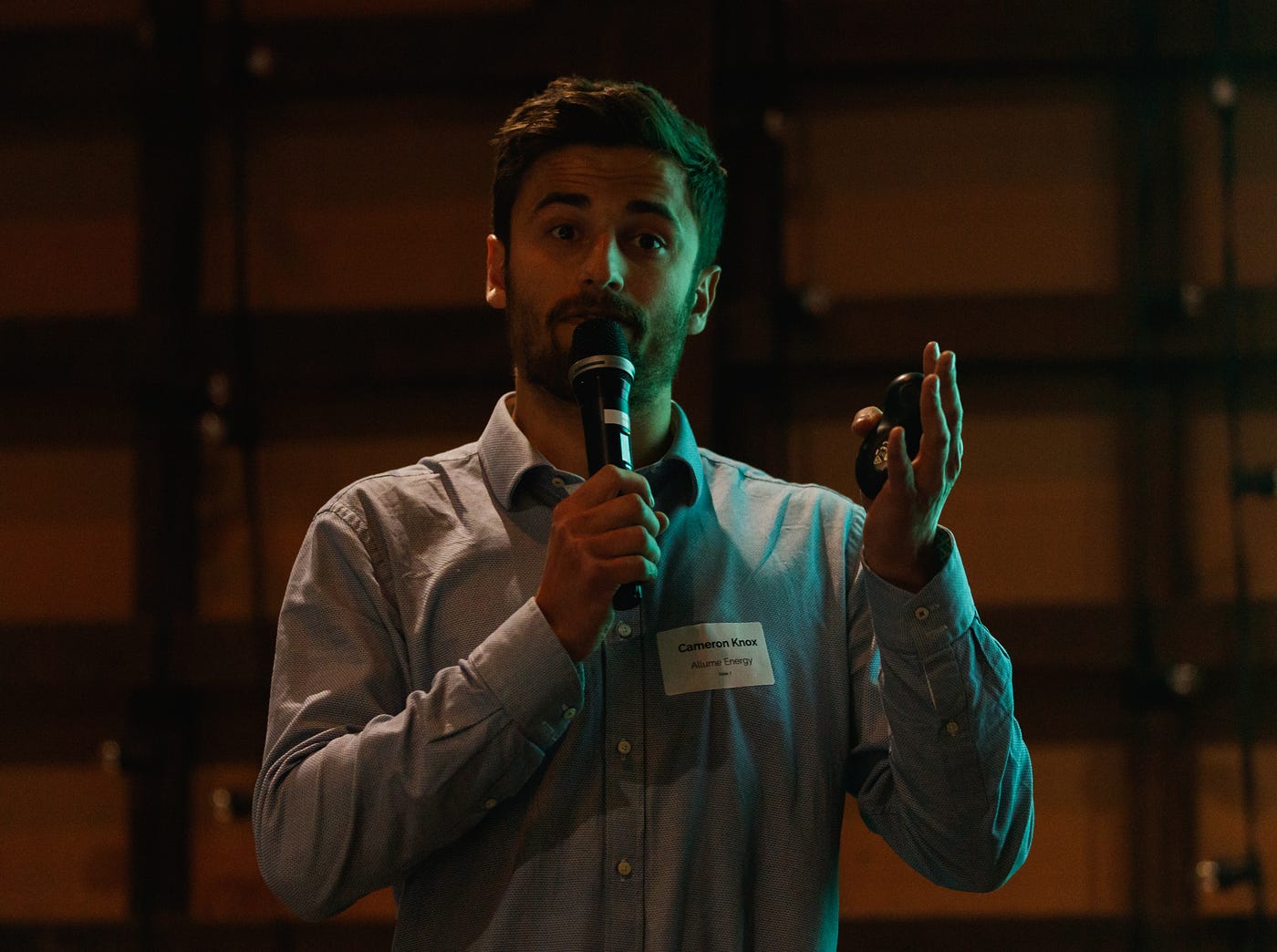Insights from Renewable Energy Experts
Renewable Energy Founder Dinner
At Innovation Bay we believe the energy sector is ripe for disruption and that tech entrepreneurs will be a key driver of that change — which is why we co-hosted our first Renewable Energy Founder Dinner with the Australian Renewable Energy Agency (ARENA) last month. This event shone a spotlight on Australia’s rapidly-growing renewable energy sector, bringing together startups, investors, and ecosystem connectors in the space.
To kick off the night, our co-founder Ian Gardiner moderated an incredible panel discussing trends in the renewable energy space in Australia. The panel featured Mike Cannon-Brookes, co-founder of Atlassian, Robyn Denholm, chair of Tesla, and Darren Miller, CEO of ARENA.

These were the main takeaways from the discussion:
Panelists are optimistic about the role of Australia and startups in the future of global renewable energy
This is an exciting time to be involved in renewable energy because of the number and variety of problems to solve. There are opportunities across the spectrum for startups to step in and make a difference with everything from solar panels — which consumers are putting on their houses in record numbers — to hydrogen — which is versatile, transportable, and flexible without needing new tech innovations. However, Australia’s future in renewable energy will need a comprehensive infrastructure plan in order to enable wholesale change.
But there’s a massive opportunity for Australia to capitalise on. Not only does Australia have an abundance of sun and wind to convert to energy, but it also has neighbours searching for energy partners. One example of this is the Sun Cable project, which is creating an underwater energy cable from the Northern Territory to Singapore. This connection is poised to become a catalyst for Australia to be a major exporter of energy, and meet the growing global demand.
Renewable energy technology exists but needs economics to back it
The panelists agreed that for renewable energy to be adopted on a wider scale, it has to be the cheaper, faster, better option. The necessary technology to capture, store, and deliver renewable energy already exists, but the curve of the technology and the economics still need to line up. Until financial and business models make renewable energy the undeniable best choice, behaviour will be tough to change.
On the plus side, as the technology scales up, costs will go down, and because of this we’ve seen renewables become much less expensive in recent years — for example, in 40% of countries renewables are cheaper than coal.
In the near term, we’re also seeing businesses take on leadership roles with initiatives like RE100, which Atlassian has committed to. RE100 is focused on bringing together major companies committed to sourcing 100% renewable electricity globally by 2050 (Atlassian is aiming for 2025). With over 87 companies pledging similar goals, there’s likely to be a pull through effect in wider society.

Betting big can accelerate innovation
The panel also discussed the South Australia Battery Project. This project was famously conceived via a bet that Mike Cannon-Brookes and Elon Musk made on Twitter in 2017. Amidst acute concerns about power supply in Australia, Musk promised Cannon-Brookes that Tesla would install a 100 megawatt hour energy storage plant in the South Australia within 100 days of a contract being signed or it would be free.
Promising the installation of the world’s largest lithium battery in such a short time frame was a risky bet for Tesla, but thanks to the alignment of political backing, financial funding, and public opinion, this project moved quickly and was completed on time. The project proved to be feasible and profitable and, importantly, inspired the implementation of other batteries across the world.
Panelists’ advice for founders
- It’s going to be a lot harder than you think it will be. It can be super lonely too, so make sure you manage your mental health.
- Find the joy in your journey through the ups and downs.
- Solve a big problem, and then convince people your solution is the best one.
- Be scrappy. You’re going to need to solve a lot of problems quickly, and you need to be willing to go around, under, over, and through walls — or build a tunnel under or fly a drone over the walls!
- Be reliable. Always be prepared before the Ts & Cs are signed so that you can meet your deadlines and complete your deliverables on time.
Meet the Startups
After the panel, 5 ambitious startups pitched to our audience of sector-interested investors and connectors. Many connections and conversations were sparked and we look forward to the positive impact our founders will make on the industry!

Learn more about the amazing startups that pitched:
- Cameron Knox — Allume Energy Making rooftop solar accessible and affordable for apartment residents and businesses in multi-tenanted buildings.
- Carola Jonas — Everty Provides a cloud-based SaaS platform to companies installing Electric Vehicle (EV) charging infrastructure.
- Chris McGrath — 5B Makes solar projects lower cost, faster and smarter by combining fewer materials and lightning-fast deployment to streamline logistics.
- Will Mosley — RayGen Solar Power Plant that is a low-cost solar + storage system and is designed to address the $1+ trillion opportunity of aging coal assets.
- Julian Broadbent — AEV Robotics Creator of the Modular Vehicle System, commonly referred to as a ‘smartphone on wheels’. The foundation of every vehicle is a robotic base.
All of the founders are looking to raise funding between Seed to Series A, and make connections in their industry. If you can help, and would like us to facilitate any introductions, please let us know.

A huge thank you to the panelists Mike Cannon-Brookes, Robyn Denholm, and Darren Miller for sharing their passion and experience with us. Special thanks to our event partner, ARENA — especially Nick Zeltzer and Alex McIntosh who have been an amazing team to work with. Thanks as well to our supportive sponsors AWS, KPMG High Growth Ventures, and Macquarie, and to everyone who attended.
Let’s keep the conversation going on social. Share this article with your thoughts about the renewable energy space on Twitter (@innovationbay) & LinkedIn. To learn more about our upcoming events for founders, investors, and tech enthusiasts — sign up to become a member of our community!